27 Best (And Worst) Online Russian Courses In 2023
 Written byHubert Nagel
Written byHubert Nagel- Read time26 mins
- Comments9

Finding the best online Russian courses can be difficult for most learners.
Content options have only slightly improved since I learned Russian a few years ago, so there’s still room for a lot more.
Russian is definitely one of the less popular major foreign language choices in the world, but of all the languages I’ve learned, it was by far one of the most rewarding.
If you’re just starting out, I can assure you that you’ve made a great decision.
There are many great reasons to learn Russian – travel to Russia is totally worth it, but it also opens up lots of business and career opportunities in many sectors.
For those living in the US, there are huge Russian enclaves in parts of the country, so speaking Russian enables you to communicate with your neighbors in those places.
Plus it’s just a really fun language to speak with a rich history.
Read my earlier posts on my immersion experience in Russia.
So today, I’ll share the best (and worst) of all the popular online Russian courses for you (I’ve had the chance to use most of these courses).
I’ll give you my informed opinion as a fluent Russian learner/speaker.
Below you’ll find pros and cons for each course, pricing and a brief summary. If there’s a review written about a product on this site elsewhere, I’ll link to it.
Some are affiliate linked – most aren’t.
Table Of Contents
- Rocket Russian
- Russian Uncovered
- RussianPod101
- Glossika Russian
- Pimsleur Russian
- Grammar Hero (Russian)
- Rosetta Stone
- Mango Languages
- 3ears
- Mondly Russian
- Real Russian Club
- Red Kalinka
- RT.com
- Earworms MBT: Rapid Russian
- FluentU
- Russian Language Guide
- Memrise
- Transparent (Russian)
- LingQ
- Mimic Method (Russian)
- Babbel Russian
- Duolingo Russian
- Michel Thomas Russian
- Busuu
- FSI Russian
- Live Lingua
- Living Language
NOTE: Some of the items listed below probably aren’t necessarily “courses” for Russian per se. The reason I’ve included them is that they’re popular enough Russian tools to be included.
DISCLAIMER: The comments below are personal opinions.
The best Russian courses online (most popular Russian resources)
1. Rocket Russian

Cost: Starts from $99.95 (auto-applied discount)
Summary: I’ve always been a vocal fan of the Rocket Languages series and the Russian edition is definitely my top recommendation. Of all the Russian course options listed below, Rocket Russian suits the structured learner most as it’s designed to be followed in a linear progression.
Good news for go-it-your-own-way learners: you’re not obligated to follow their path and you can skip lessons if you want to.
The audio lessons are basically a podcast-style format that’s very easy to follow, no filler content and audio dialogues that give you just the Russian dialogue you need and nothing more (which I love). Rocket Russian’s course covers all the language skills very well, and their inbuilt voice recognition is extremely accurate if that’s something you find useful (it uses Google’s Web Speech technology).
For structured learner types, Rocket’s a great Russian course.
You can also check out my Rocket Russian review.
What I love about it:
- For learners wanting structure in their course learning (though not restrained by it), it has a very clear linear progression.
- It covers all 4 major skills evenly (listening, speaking, reading, writing).
- It’s very comprehensive.
- Students are motivated by the inbuilt leaderboard.
What I don’t like:
- Needs to offer levels 2 and 3 for higher-level students.
Join The Guild by clicking here, select Russian and I’ll send you a unique offer for Rocket Russian exclusive to my readers only.
2. Russian Uncovered (StoryLearning)

Cost: One time purchase of $297.
Summary: Russian Uncovered is another unique way to learn Mandarin Russian. Olly Richard’s program begins by immediately throwing you into an easy Russian story and you learn through a “Guided Discovery” method, which includes classes with a native Russian teacher.
Instead of just learning about grammar rules, learners come across them through fictional narrative. It provides a fun and unique way of learning a language, though is slightly expensive.
What I like:
- Unique story-based method
- Clear instructions with lots of practice
What I don’t like:
- May appear overwhelming for new learners
- Seemingly unrelated grammar points thrown into lessons
- Expensive
See this Russian Uncovered review.
3. RussianPod101

Cost: Starts as low as $4 a month.
Summary: RussianPod101 has made strides in recent years. It used to be a messy mishmash of very low quality audio and video but they’ve since introduced learning ‘pathways’ and greatly improve the quality of their content.
There’s still improvement to be made but overall it’s excellent.
RussianPod101 also teaches using a podcast format (usually two hosts bantering about a particular topic). There are also videos that different topics at different levels.
Like Rocket Russian, transcripts and PDF’s are downloadable and high quality for the most part.
See my RussianPod101 review.
What I like:
- Quite inexpensive.
- Loads of Russian lessons to work through – no shortage of content.
What I don’t like:
- Low quality, old videos in some of the lessons.
- Clunky interface.
UNIQUE OFFER: Use the code MEZZOGUILD to save 25% on any of their Russian course options.
4. Glossika Russian
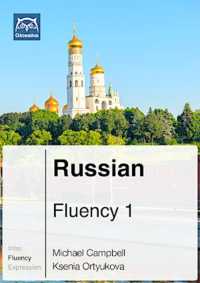
Cost: $30 a month.
Summary: Glossika is one of the most unique (yet simple) language products available and, in my opinion, one of the very few that uses a natural, research-grounded method. In fact, the Glossika method aligns very closely with how I personally learn languages (including Russian) and I’ve seen tremendous success doing it.
I used Glossika Russian when I lived in Russia and it helped me attain conversational fluency in a few months.
The point of Glossika Russian is high repetitive of lexical chunks – in other words, listening over and over to a sequence of sentences at natural speed and repeating them. It is hands down the most effective trainer for listening comprehension I’ve seen.
Russian grammar is absorbed naturally without tedious memorization of rules. Just lots of listening and repeating!
What I love about it:
- One of the closest Russian course products to my own personally-developed, proven learning style.
- No grammar memorization or unnatural language learning.
- Well-suited to Russian learners who prefer audio rather than visuals.
- Access to every other language and language pair with one single subscription.
What I don’t like:
- Needs a better way to teach students how the approach works.
- Audio of some languages (not Russian) is of an inconsistent quality.
- Reported errors in scripts (I’ve yet to encounter any personally).
5. Pimsleur Russian

Cost: $14.95 a month subscription (or $119.95 per level).
Summary: Most people have heard of Pimsleur. It’s a classic favorite for learning Russian using spaced repetition recall. The lessons focus on practical vocabulary and expressions one might need in various scenarios. This includes greetings, common phrases, and vocabulary you might need when visiting a Russian speaking country.
The Pimsleur method prepares you for the necessary Russian you need to get by in your travels in a short period of time. This is one of the best online Russian courses despite its age, and is an affordable program that can be subscribed to, or buy the full program which includes 30 lessons for $119.95.
Read my Pimsleur review.
What I like:
- Pimsleur is a timeless masterpiece that is based on solid research in second language acquisition
- The course only requires 30 minutes a day of studying
- There is a lot of listening and repeating phrases for easy memorization
What I don’t like:
- Outdated scenario examples
- Too much English
6. Grammar Hero (Russian)
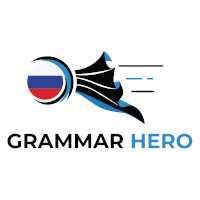
Cost: $197
Summary: Grammar Hero was produced by my friend Olly Richards from I Will Teach You A Language. It’s a series that covers several languages including Russian.
The purpose of Grammar Hero is to use story-based instruction to simplify difficult-to-grasp grammatical concepts in Russian. It takes common problems that most learners experience with Russian grammar and walks you through it carefully.
See my Grammar Hero review.
What I like:
- Produced by a good friend of mine who I can verify is highly qualified and experienced in language pedagogy
- Course does a great job of simplifying Russian grammatical concepts
- Covers most of the main questions that new learners have
- Based on good quality, custom-written reading material
What I don’t like:
- Overpriced
- Way too grammar-heavy in my opinion
7. Rosetta Stone Russian

Cost: Starts at $6.49 a month.
Summary: Rosetta Stone is by far the biggest household name in language learning and one of the most popular courses for learning Russian.
It used to be an expensive boxed product but now offers an affordable online subscription.
The strength of Rosetta lies in its unique immersion process. Since there is no translation or explicit grammar, you must learn vocabulary, grammar and speaking skills through intuition. The course intuitively promotes learning Russian through simple language patterns for a low subscription cost.
See my incredibly popular review of Rosetta Stone.
What I like:
- No need to memorize long rules and words
- Unique learning style that uses your intuition
- Easy to recognise the language patterns
What I don’t like:
- Is off-putting to people looking for explanations of Russian grammar
- Inappropriate images and visual cues
8. Mango Languages

Cost: $7.99 a month
Summary: I admit that in the almost decade that I’ve been running this site and reviewing language products, I only recently tried Mango Languages.
I wish I tried it earlier.
Mango Languages has implemented what I believe to be one of the most intuitive ‘chunking’ approaches in its course style (very close to my own personal method). It does this by avoiding grammar explanations and instead highlighting lexical chunks in colors to help you learn language patterns.
One of the best features I’ve seen in a language product. Period.
The only problem with Mango is that it’s quite lightweight on its course depth and I wish they’d go further for advanced learners of Russian and other languages.
What I like:
- Mango’s intuitive ‘chunking’ interface is one of the best implementations I’ve ever seen in a language product
- Beautifully designed and a pleasure to use
- Inexpensive
What I don’t like:
- Lacks the course depth I would expect to see in such a great platform making it mostly unsuitable for higher-level learners
9. 3ears
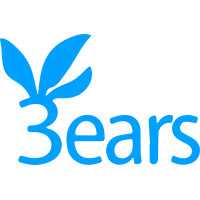
Cost: Free (but they appear to be working toward a paid product)
Summary: 3ears is a gem that few people seem to be talking about. I’ve been following their progress for years with great anticipation.
It’s very similar to FluentU (see below) in the way it works – it sources video from YouTube and provides a wrapper with interactive subtitle elements. You can click on words in the subtitles and the app will retrieve detailed information about that word (seems to be machine translated).
It’s super handy and doesn’t cost anything (yet).
What I like:
- Currently 100% free to use
- Tonnes of video content to watch and learn from (all sourced from YouTube)
- Detailed and comprehensive info for words clicked in the interactive subtitles
What I don’t like:
- Clunky and buggy interface
10. Mondly Russian

Cost: Starts at $9.99/month.
Summary: Mondly offers courses for loads of different languages and is similar in style to Busuu, Duolingo, and Babbel. Even hints of Rosetta Stone in its delivery.
It’s a beautifully-designed web app and a pleasure to navigate the course content.
Some of the courses aren’t that great (e.g. Arabic) but Russian and others are done really well.
What I like:
- Great for learning a lot of vocabulary
- Daily lessons, weekly quizzes, monthly challenges
- Encourages you to practice daily
- Vocabulary drilled effectively
What I don’t like:
- Content and exercises are the same for all levels
- Mostly passive exercises
- Order of lessons and topics not designed well
- Interface not user friendly and unappealing
See this Mondly review to learn more.
Other excellent online Russian courses
I’ve mentioned my personal preferences for Russian above but there are loads of other quality online course options for Russian.
Keep reading.
11. Real Russian Club

Cost: Free + Premium options ($200 for the full collection)
Summary: Run by Daria, a Russian native with a massive online following. She’s got a plethora of learning material (most of it’s completely free).
What I like:
- Zero cost for the free content
- High quality videos that are easy to follow
- Slow listening material
What I don’t like:
- Free lesson content is quite thin – not a whole of substance beyond the videos
- Whiteboard style learning is not my preferred instruction style (personal preference)
12. Red Kalinka

Cost: EUR29 per month
Summary: Red Kalinka is really a smorgasbord of Russian language products and courses. The site has been around for a long time and is loaded with an overwhelming range of content.
The content is comprehensive, though the delivery style isn’t my personal preference. Access to a live tutor is definitely a big bonus, though this could easily be supplemented by another online tutor service.
What I like:
- Very comprehensive and reputable
- Personal tutor access included
- Inexpensive
What I don’t like:
- Dated interface
- Dull lesson style
13. RT (Learn Russian)
Cost: Free
Summary: Kind of like the BBC language lessons, RT has a similar thing here for Russian learners.
It’s a free language course that goes into a surprising amount of detail covering loads of different topics. Best part about it – it includes quality audio.
I’d say it’s handy as a quick reference for vocabulary and expressions in Russian but you might need to find something more substantial before long.
What I like:
- Free
- Quite comprehensive considering its age and zero cost
- Covers a wide range of topics that are useful for all Russian learners
- Includes audio
What I don’t like:
- Seriously dated website and interface
- Better used as a quick reference guide than a “course”
14. Rapid Russian (Earworms MBT)
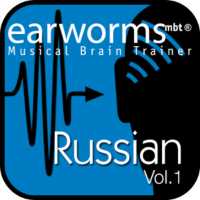
Cost: $13.50 per level
Summary: Earworms MBT is one of the most underrated and unique Russian products I’ve ever seen. It’s based on actual scientific research into “earworms” (stuck-song syndrome) and exploiting that for language memorization.
I’ve had personal success with this product.
It was the first product I used in Russia and seriously kick started my momentum learning the language. The catchy music was easy to listen to each morning and stayed in my head all day.
What I like:
- One of the most unique and underrated products I’ve ever seen and based on actual scientific research
- Extremely effective and getting you to remember expressions in Russian
- Inexpensive
What I don’t like:
- Needs to go deeper beyond tourist-level language
15. FluentU Russian

Cost: FluentU costs $30 per month. Users can get 4 months free when signing up for a full year at $240
Summary: FluentU helps students learn Russian through the use of real-world video content. The concept behind this style of instruction is to provide an immersive online ‘course’ (kind of).
Students learn by watching scenes from Russian videos that pertain to real-life Russian culture and it features Russian and English interactive subtitling.
See this review of FluentU too.
What I like:
- This is a great option for learners who don’t enjoy a lot of reading.
- There is a two-week free trial available.
What I don’t like:
- The downside is that it does not offer any live instruction and the learning environment is very non-traditional (even compared to a typical online course) which may not be ideal for all learners.
16. Russian Language Guide
Cost: Free
Summary: Russian Language Guide is a course in the form of a blog that covers lots of Russian language and cultural topics.
There’s no audio unfortunately, but it’s a handy little reference point for Russian grammar and verbs.
What I like:
- Handy and concise reference for Russian grammar and verbs
- Covers quite a lot
- Free
What I don’t like:
- Basically just a blog
- Currently no audio
17. Memrise (many Russian courses)
Cost: Free
Summary: For some bizarre reason, Memrise thought it would be a good marketing decision recently to move its free “community” courses to a site called Decks, while running a premium subscription on the original Memrise site.
From what I gather, Decks is identical to what Memrise use to offer (UPDATE: Memrise reverted back to the original site and scrapped Decks).
These are 100% free community-added courses in the form of a gamified flashcard deck. You select a language or dialect, then go through a flashcard game of “watering plants”. It’s highly addictive and actually quite effective.
Not all of the Russian courses are good. Look for ones that include audio and, in my opinion, teach phrases rather than words.
What I like:
- Repetition makes it easy to learn words
- More fun than traditional flashcard apps
- Many courses to choose from
What I don’t like:
- Should be used with other resources or upgrade to the paying version
- Not a main tool for learning Russian
18. Transparent Russian
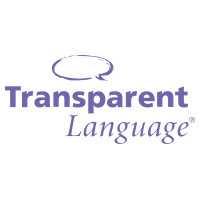
Cost: Prices vary widely depending on course option
Summary: Easily one of the most surprising online Russian courses I’ve tried.
The system and interface are quite dated and slow which is a real drawback, but if you can look past that, Transparent Language provides a real depth of Russian content.
Voice recognition comparison is non-existent in Transparent Language. It relies on recording on your voice and showing you your sound wave to compare with the native speaker’s sound wave.
No inbuilt system to automatically compare sounds.
Programs like Rocket Russian used to do the same thing but recently incorporated Google Web Speech to compare pronunciation. I don’t know why Transparent Language haven’t done this since it’s so easy to implement.
The Transparent Language course has a “Produce it. Say it.” section that literally asks you “Were you right?”.
In other words, no way to automatically detect whether you were correct or not – it relies on your own determination. This is incredibly outdated.
Overall, if you can look past the outdated design and deficient voice recording aspect, Transparent Language Russian is an outstanding course option.
What I like:
- Russian dialogue is 100% natural speed
- Extensive coverage and depth of content
What I don’t like:
- Outdated and slow interface that’s a pain to navigate
- Pronunciation section has no inbuilt voice recognition to compare to native dialogue
19. LingQ

Cost: $12.99 a month
Summary: LingQ has been running for many years now and was the first assisted reader product that includes Russian. There have since been other spin-offs that aren’t quite as good.
The library of reading material to read from and increase vocabulary is extensive – there’s no shortage of Russian material to use.
I like LingQ but I personally use LWT (Learning With Texts) which is 100% free.
What I like:
- Affordable
- Extensive library of reading material
- Very easy-to-use interface
What I don’t like:
- Restricted to a literary learning style
- LWT is a free and better alternative in my opinion (but too difficult for most people to install)
20. The Mimic Method Russian
Cost: The Mimic Method costs $197 and provides users with lifelong access to their materials.
Summary: Mimic advertises a course that focuses completely on pronunciation (treating language like song). The program can be technical and difficult to get through, but if your only goal is to improve your pronunciation, it may good for you.
This program has a high price tag of $197 a pop.
Some of the information in this course can be found online for free. It’s easy to navigate and well-organized but it’s still quite expensive. One of the more unique Russian methods around and has fantastic reviews.
What I like:
- Some of the homework is interesting and unique for language courses
- They provide in depth instruction on elemental sounds
- It provides a different way to learn to speak a language
What I don’t like:
- Way too expensive
- Not a lot of material for the price
- Is not very engaging and doesn’t do much to keep interest
- Needs to be supplemented with other resources
Online Russian courses that are low on my list and not personally recommended
Some online Russian courses are popular but in my opinion, not that great (personal point of view).
I’ve listed them all here. If you disagree, comment below.
21. Babbel Russian
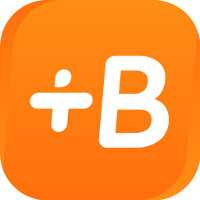
Cost: Babbel is well-priced for the services offered, with current subscriptions priced at $12.95/month.
Summary: Another option for one of the best online Russian courses, Babbel, is a great tool for learning the language and very budget friendly. Babbel’s online Russian course platform focuses on writing and reading, listening and spelling. It aims to give you all the tools you need to start learning the language immediately.
Babbel is available for businesses who need their employees to learn Russian. It is also available as a gift. With a variety of packages available, it is easy to find the right one for your Russian learning needs. Babbel charges monthly and packages range from around $6 to $12 a month.
Think of it as a paid, and slightly better version of Duolingo.
Read this extensive Babbel review.
What I like:
- Flexibility and variety in their teaching style
- Incorporates several different learning styles to effectively teach Russian
- Allows for self-paced learning
What I don’t like:
- No one speaks with a native accent
- No downloadable materials
- Weak in conversational skills
22. Duolingo Russian

Cost: Free.
Summary: Duolingo is now a household name, and is being used as a supplemental program by school in their language courses. It’s fun and free although it does have a paid subscription upgrade that removes adds and has extra resources for a few bucks a month.
The idea behind Duolingo is that they make learning Russian fun and keep students coming back every day through a gamified learning. Russian is learned through a variety of exercises and lots of repetition.
Not a fan personally but it’s free.
Check out this comparison of Duolingo and Rosetta Stone.
What I like:
- Interactive lessons let you speak and listen in Russian
- Offers competitive events between friends and interaction with other users
- Its great for an introduction to the language and learning the basics
What I don’t like:
- The audio voice can sound a bit unnatural
- Not really comprehensive enough to become fluent
23. Michel Thomas Russian

Cost: Starts from $11.99
Summary: I reviewed Michel Thomas extensively a while back and ended up with almost nothing positive to say about the course (both levels). I’ve received mountains of criticism for review! The Michel Thomas method is, in my opinion, full of holes and defies current research conclusions in SLA.
The basic premise of Michel Thomas is that you relax like a client in a psychologist’s chair, and let the teacher control your learning. You’re told “never to try to learn”, no memorization, no outside practice, no student responsibility.
Michel Thomas teachers guide students through correcting their every mistake on the spot.
There’s no listening comprehension training and no natural conversation opportunities during sessions.
Overall, Michel Thomas Russian might be a useful primer but I would never recommend this course personally.
Read my detailed and highly controversial Michel Thomas review for more info.
What I like:
- No need to write or memorize
- Grammar is introduced naturally and gradually
What I don’t like:
- Teacher-led.
- Constant error corrections.
- Does not prepare Russian students for real conversations and listening comprehension
24. Busuu Russian

Cost: Starts at $5.83 a month.
Summary: Busuu is another program that’s similar to Babbel and Duolingo, however it isn’t structured as well as the other courses and has less instruction in vocabulary before the important components begin.
The overall design of Busuu is beautiful but it just lacks sufficient depth.
There is a free version of Busuu which features a language exchange section. This is a good choice. However, their subscription service which charges over $8 a month with a three-month minimum, may not be a good value for the money.
What I like:
- Learning platform is well designed
- Language exchange is a free, easy-to-use app
- Very popular online learning program
What I don’t like:
- Program lessons leave a lot to be desired
- Not enough pronunciation and grammar
- Better courses available for free
See this Busuu review.
25. FSI Russian
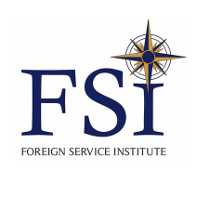
Cost: Free
Summary: FSI (Foreign Service Institute) is a government entity that trains diplomats and government officials in foreign languages. There’s a Russian course that’s currently available online to download for free (includes audio).
The problem with the FSI material is that it’s literally been around for almost a century.
It’s old. Really old.
So although you can download the comprehensive, detailed Russian course for free with audio, be aware that the material is literally photocopied booklets that were typed up on typewriters making it unbearable to use.
If you’re patient, there’s some good value in the FSI courses but it’s so dated that I personally wouldn’t bother.
What I like:
- Being a US government entity that trains diplomats, FSI naturally has incredible course depth.
- Free and easy to download lesson + audio on many sites.
What I don’t like:
- Very old course.
- PDF material is still just a photocopy of the original, typewritten paper so it’s dreadful to read.
26. Live Lingua

Cost: Begins at $10.99 an hour.
Summary: Live Lingua matches you to a native speaking, private online Russian tutor and allows you to learn at your own pace. You can take a free lesson for trial.
While their lessons are affordable for a private tutor, starting at $16 an hour, you can get a discount with a bundle. For the price they charge, you may find it more economical to just use italki.
What I like:
- Private one-on-one lessons over Skype
- Provides a wide range of materials for learning Russian
- Lots of program support
What I don’t like:
- More expensive than other online Russian language tutors
- Options are not as flexible as other programs
- Uses free courses from other sites
27. Living Language
Cost: Begins at $10.99 an hour.
Summary: I’ve never been a fan of Living Language since I reviewed it several years ago. I’m including it on this list because it is one of the big names and most popular courses for languages like Russian (plus I get asked about it from time to time).
I personally found Living Language to be bland, incorrectly levelled and just a very uninspiring grammar-heavy course.
Definitely not my cup of tea (though it might suit people who love grammar).
What I like:
- Quite thorough in its Russian grammar explanations
What I don’t like:
- Incorrect levelling – especially for higher levels
- Trashing of competitors (i.e. Rosetta Stone) in its marketing is extremely off-putting
Summary: Best online Russian courses
I think I’ve covered just about every online Russian course option currently available (let me know in the comment section if I’ve missed one).
No matter which Russian course you choose, frequent Russian practice with native speakers is imperative; ideally in person if you can (even more ideal if you can do it abroad).
If finding native speakers near you isn’t feasible, then italki is an incredible platform to find really affordable Russian partners and tutors.
Overall, your success is determined by your own determination and initial motivation.
Even if you took every course on this list, you’d still fail at Russian without the right motivation and consistency.
Likewise, even less-than-stellar Russian courses can be powerful in the hands of someone with the right attitude and learning style.
If you’re looking for personal tips on how to learn Russian and overcoming various language learning struggles (from my own research and experience), make sure to subscribe below by ‘Joining the Guild’.
Know of a Russian course that I didn’t mention?
Share it below in the comment section.
 Grab the link to this article
Grab the link to this article